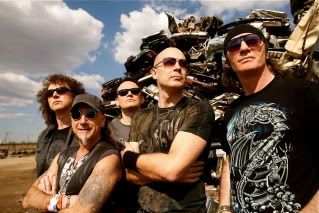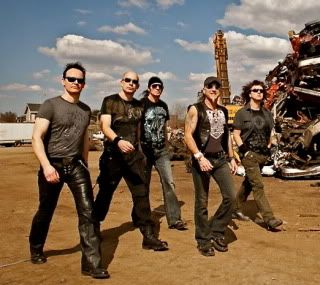ACCEPT - Lessons From The Old School: Class Is Now In Session
May 6, 2012, 12 years ago
This interview is testament to the fact that no matter how cutting edge present day technology may be, it’ll never replace old school principles.
Booked for a phone interview in the midst of a European tour, ACCEPT guitarist Wolf Hoffmann dutifully took on the task during a travel day, only to be confronted with a mobile signal that refused to cooperate as the band’s tour bus hurtled down one of Germany’s highways. Thus, two dropped calls later and Hoffmann questioning the wisdom of interviews being scheduled while the band is in transit, he opted not to call back a third time, leaving BW&BK; with half an interview and a half-baked story. Fast forward 24 hours to an unplanned and completely unexpected phone call from Hoffmann, settled in his pre-show (and stationary) hotel room, who had chosen to step up of his own free will and finish the job rather than write us off as a digital-age hiccup.

Not that Accept desperately needs the coverage. Hoffmann is certainly happy to have it, but the buzz surrounding the band’s new album, Stalingrad, is as loud and in-you-face as the justified hype surrounding their rousing 2010 comeback, Blood Of The Nations.
“I guess we’re just firing on all cylinders at the moment,” muses Hoffmann. “We were away for quite some time, so maybe that recharged out batteries enough to give us the energy to keep going like this, but sometimes I ask myself how we’ve managed to do it again. I don’t know. We just go out and do it.”Stalingrad marks Accept’s second outing with vocalist Mark Tornillo, who replaced original singer Udo Dirkschneider behind the mic for the reunion when the U.D.O. frontman made it brutally clear he wasn’t interested. Months of touring behind classic and new Blood Of The Nations material quite naturally tightened the bonds of this new Accept incarnation, suggesting the band was much more focused going in to do Stalingrad.
“It wasn’t dramatically different,” Hoffmann says of the creative process. “The only difference was that we were, as you said, a little more in tune with what we were going for. When we made Blood Of The Nations we were fishing a little bit; where does Accept belong in 2010? We weren’t sure if we should go the totally old school way or of we should try to incorporate some newer elements in out sound. But, because everything worked out so well with Blood Of The Nations we kind of decided not to change a winning formula. We just tried to come up with new songs that were as good as the one on Blood Of The Nations. The ideas on Stalingrad are fresh along the same lines, and that was our goal.”Of course, no Accept release would be complete without a few people waiting for the band to sewer out the way they did forever and a day ago with Eat The Heat and David Reece in 1989.
“Yeah, but people are always afraid,” Hoffmann scoffs. “Last time out they were afraid we couldn’t deliver at all, now they were afraid we couldn’t deliver again… (laughs). Somebody’s always skeptical initially, wondering about the album title and so on, but then they hear the album and everybody’s excited. The end result is always what matters.”
It has to feel good knowing they’ve silenced Accept’s detractors with Stalingrad, one would assume for good. Particularly when you consider Blood Of The Nations bitchslapped the hard core pre-release skeptics into awestruck fanboy worship.
“Oh yeah, man,” he laughs. “I don’t think you could have more skepticism than what we had when we first announced that we were going to reunite. We got hit pretty hard by the wave of naysayers and criticism. I actually had to tune out at one point because I couldn’t stand the comments anymore. I found it pathetic and sad that people would make up their minds about us before they’d even heard anything. I feel vindicated, sure, and we had quite a few people practically making public apologies to us, which was very cool (laughs).”“Mark does the old stuff so well that I never had any doubt that this was going to work. The one factor that we didn’t know was how the fans were going to react. Sometimes it’s not a question of how good the band is, but how the fans see the band. That was the big unknown factor when we came back. There was also the timing, which was just right for Accept. I don’t know if this would have worked 10 or 15 years ago.”
In his review of Stalingrad (found here), BW&BK; scribe Mark Gromen noted that the album sounds as if it has been tailored for twin guitar interplay between Hoffmann and Herman Frank, whereas Blood Of The Nations was built on the foundation of Hoffmann’s axe alone. Not so, he says.
“I have to disappoint you there. Stalingrad was written the same way as Blood Of The Nations, and I did pretty much all of the guitars on the album, which is exactly what I did for the last album. Nothing really changed behind-the-scenes in that respect. The same guys writing the songs are the same guys playing everything. I’ve been playing the all the guitars on the Accept albums since 1983. That’s Accept’s style, and a lot of it is me. The twin guitars are an integral part of the band’s sound, but in the studio it’s usually just me. Since I write the stuff I might as well play it.”“Mark’s role was pretty much the same,” Hoffmann adds. “The songwriting is usually in Peter’s (Baltes/bass) and my hands, and then he comes in and does the vocal parts. Of course the songs change because we write them for Mark, but they always start with a guitar riff and a melody. He’s part of the team.”

Stalingrad also features the return of producer Andy Sneap, who Hoffmann and Baltes credit for steering them in the right direction while writing material for Blood Of The Nations. The band could have gone with anyone, but it was clear from the beginning they wanted Sneap behind the board again.
“Absolutely,” says Hoffmann. “Why change a winning team? We worked so well together, we wanted to work with Andy and he wanted to work with us. I would say last time out Andy’s involvement was more important because after such a long break we weren’t sure how Accept would fit in now. There was a little bit of guesswork initially on our part in trying to figure out what Accept should sound like in 2010. Having settled that with Blood Of The Nations it was much easier this time because we knew what we didn’t want and what we wanted.”It wasn’t as simple as a phone call, however, as Sneap often has several irons in the fire at once. Stalingrad was, to a degree, at the mercy of his schedule.
“It was like that to a degree, yes,” Hoffmann agrees. “Especially since Andy has this crazy idea that he has to be a rock star in his own band now (laughs). We tried to talk him out of it and failed. That did put a dent in our planning because he had some gigs with HELL to take care of, but TESTAMENT were late with the production for their new album, so fortunately we had the chance to do our mix first. It’s always a little bit of a struggle, but no producer is available 100% all the time.”Sneap is a guitarist in his own right, but he’s gone on record in interviews that Hoffmann’s playing is an inspiration, and he loves the fact that working with him means he has the best seat in the house. Asked if he’s ever offered Sneap any tips along the way, Hoffmann laughs.
“Hell no. He doesn’t take any advice from me.”There are plenty of veteran axe-slingers and up-and-coming rock stars that would gladly take a Hoffmann-led How To… course, seeing as how many old school metal fans worship the ground Accept walks on.
“Yeah, but it’s not quite like that,” says Hoffmann. “We do have some people that look up to us because we’ve been around a long, long time, and because we’ve always had a strong following of musicians. It’s great, and it’s a huge honour for me to meet people that are, in a lot of cases, so much more successful commercially than we’ve ever been. They look up to us, and that’s incredible. But, I wouldn’t mind having the attention and the success, to be honest (laughs).”











